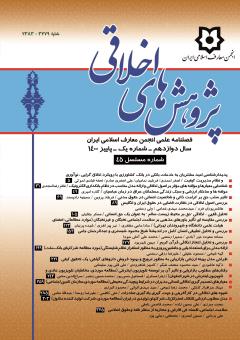شناسایی معیارها و مؤلفه های مؤثر بر اصول اخلاقی و ارائه مدل مناسب در نظام بانکداری الکترونیک
محورهای موضوعی : Ethical contexts of management and government
1 - عضو هیأت علمی گروه مدیریت دولتی، دانشکده علوم انسانی، واحد ساوه
کلید واژه: اخلاق, اخلاق سازمانی, اخلاق کاربردی, بانکداری الکترونیک,
چکیده مقاله :
اخلاق در صنعت بانکداری دارای کاربردهای گستردهای است که بر تصمیمات سپردهگذاران، سرمایهگذاران و گیرندگان تسهیلات به شدت اثرگذار میباشد. رسالت اصلی بانکها اتخاذ و استقرار روشهای بهینه تامین، تخصیص و توزیع منابع و مصارف مالی در سطوح مختلف جامعه متناسب با نیازهای پیشروست به نحوی که همزمان با انجام فعالیتهای مالی نه تنها اخلاقیات در جامعه دچار خدشه نشود بلکه در مسیر ارتقا و بهبود نیز واقع گردند. این پژوهش با هدف شناسایی معیارها و مؤلفه های مؤثر بر اصول اخلاقی در نظام بانکداری الکترونیک انجام گرفت و به لحاظ روش در زمره ی تحقیقات کیفی با رویکرد اکتشافی است. بدین منظور پس از مرور ادبیات، پیشینه و مبانی نظری تحقیق، عوامل و معیارهای مؤثر بر اصول اخلاقی در نظام بانکی کشور، شناسایی و دسته بندی شدند. بعد از اجرای تکنیک دلفی در سه دور برخی از مؤلفه ها از فهرست تنظیمی حذف و مدل نهایی آماده شد. خبرگان این پژوهش را تعداد 20 نفر از کارشناسان فعال در حوزه بانکی و خدمات بانکداری الکترونیک تشکیل می دادند که از جامعه آماری به روش نمونه گیری هدفمند انتخاب شدند. به منظور اطمینان از روایی پرسشنامه دلفی از روایی محتوایی و روایی مصححان و برای پایایی نیز از روش اشباع نظری استفاده شد. نتیجه حاصل از این ارزیابی منجر به تأیید و نهایی شدن چارچوب کلی مدل مفهومی تحقیق گردید. یافته ها نشان می دهد که مؤلفه هایی همانند اطلاعات محرمانه مشتریان، صداقت و درستکاری، تخصص و کارآمدی، مشتری مداری، مسئولیت اختیاری و داوطلبانه، مسئولیت اخلاقی و ... از عوامل اثر گذار بر نهادینه شدن اصول اخلاقی در نظام بانکداری الکترونیک می باشند.
Ethics in the banking industry has a wide range of applications that strongly influence the decisions of depositors, investors and borrowers. The main mission of banks is to adopt and establish optimal methods of supply, allocation and distribution of financial resources and expenditures at different levels of society in accordance with the needs of the future so that while conducting financial activities, not only morals in society are not damaged but also promoted. . The aim of this study was to identify the criteria and components affecting the ethical principles in the electronic banking system and in terms of method is among the qualitative research with an exploratory approach. For this purpose, after reviewing the literature, background and theoretical foundations of research, factors and criteria affecting the ethical principles in the country's banking system were identified and categorized. After performing the Delphi technique in three rounds, some components were removed from the adjustment list and the final model was prepared. The experts of this study consisted of 20 employees’ actives in the field of banking and electronic banking services who were selected from the statistical population by purposive sampling. In order to ensure the validity of the Delphi questionnaire, content validity and validity of the correctors were used, and for reliability, the theoretical saturation method was used. The result of this evaluation led to the confirmation and finalization of the general framework of the research conceptual model. Findings show that components such as customer confidential information, honesty and integrity, expertise and efficiency, customer orientation, voluntary responsibility, ethical responsibility, etc. are among the factors affecting the institutionalization of ethical principles in the electronic banking system. To be.
احمدی، فضل الله، تکنیک دلفی: ابزاری در تحقیق مجله ی آموزش در علوم پزشکی، تابستان 1387.
الهی، ب.1376. مبانی معونیت فطری. ترجمه ملیکا مابرن و فرزاد یمینی، پاریس: انتشارات دروی. چاپ اول.صفحه185.
بلبل امیری،ا، موقر،م و شیرخدایی،م.1396. تحلیل رابطه فضای کاری اخلاقی و عملکرد کارکنان فروش. فصلنامه اخلاق در علوم و فناوری. 12(2): 76-67.
حرعاملی،م.1403ق. وسائل الشیعه الی تحصیل مسائل الشیعه.تهران .صفحه:24635.
خیاط مقدم، س. و م.طباطبایی نسب.1395. مولفه های اخلاق حرفهای در مدیریت. فصلنامه اخلاق در علوم و فناوری11(1): 136-127.
سيد جوادين، ر. و م. سقطچي.1385. بانکداري الکترونيک و سير تحول آن در ايران. ماهنامه تدبير 170: 57-63.
عیوضلو،ح و قلیچ، و. 1394.بانکداری اخلاقی. درسهایی برای نظام بانکی ایران.فصلنامه علمی-ترویجی اقتصاد و بانکداری اسلامی10(1): 27-52.
عیوضلو،ح و قلیچ، و. 1396.راهکارهای برقراری بانکداری اخلاقی در نظام بانکی ایران. فصلنامه علمی-ترویجی اقتصاد و بانکداری اسلامی،20:77-49.
عیوضلو ، ح.1387. درآمدی بر معرفی ارکان و هسته سخت اقتصاد اسلامی. دوفصلنامه مطالعات اقتصاد اسلامی1: 158.
مجلسی،محمد باقر.1403ق. بحارالانوار لدررالاخبار الائمه الاطهار. بیروت: موسسه الوفاء. صفحه25.
محمدی ری شهری، م.1367. میزان الحکمه.بیجا: مکتب الاعلام الاسلامی.ج5. صفحه 24635.
مکارم شیرازی،ناصر. 1385. اخلاق در قرآن.قم: نشر مدرسه الامام علی ابن ابی طالب(ع). صفحه244.
Aansari, M and Hosseini A and Rahmany-Youshanlouei H and Seifi S.2012. Effect of Professional Ethics on the Loyalty of Bank Customers.Ethics in science & technology; 7(3): 62. (In Persian).
AGWU ME.2017. Empirical Analysis of Retail Customers Adoption of Internet Banking Services in Nigeria. Journal of Internet Banking and Commerce; 22(1):1-17.
Arnaudov, K and Koseska .E.2012. Business ethics and social responsibility in tourist organizations in terms of changing environment. Procedia - Social and Behavioral Sciences; 44: 387-397.
Dajkhosh, Ss.2013. Modeling business ethics using analytic network process (ANP). A fussy approach.[MA Thesis].Tehran: Tarbiat Modares University.(In Persian).
Dahl R, Jacob and Mattsson, J. 2015. Ethics in the bank internet encounter: an
explorative study. Journal of Information. Communication and Ethics in Society;10(1): 36 – 51.
Dehghan Manshad ,S.2011. Identify and ranking of the factors affecting professional ethics. Entrepreneur Magazine; 86. (In Persian)
Gharamaleki. F.2007. Ethics in business organizations. Tehran. National Centre for Globalization Studies. p. 45-64. (In Persian).
Moghimi, E. 2016. The relationship between ethics and employee creativity. Ethics in Science & Technology; 10(3): 85-92. (In Persian).
Tota, I and Shehu .H.2012. The Dilemma of Business Ethics. Procedia Economics and Finance; 3: 555-559.

